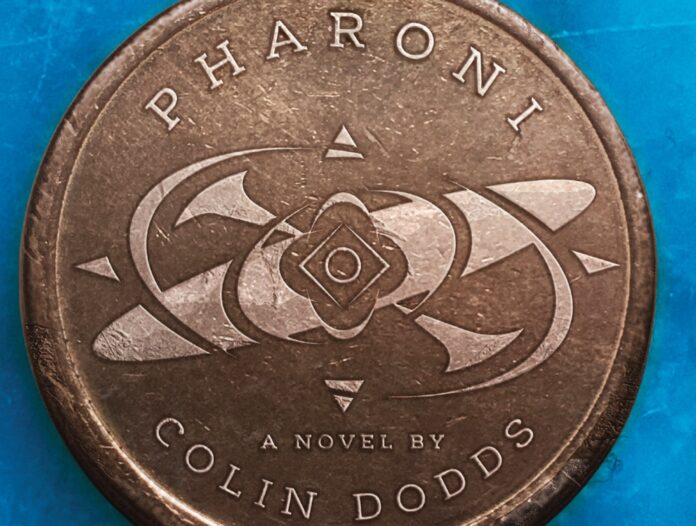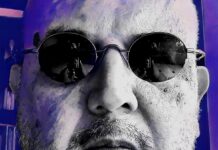Pharoni is the story of what happens when Harry Injurides returns from the dead. His reappearance and his message send his friends in strange directions. They launch tech empires built on digital pain and start reluctant religions. Eventually, those friends wind up in a vicious conflict that forever changes what it means to be human.
Author Colin Dodds narrates here the interesting story behind the making of Pharoni.
**
There are at least two stories to how a book is written. The first is what was happening to the author when they wrote it. The other is how the ideas and impulses that animate the work found their way to one another.
Call one the public history and the other one the hidden history. The two stories are not independent, but they can be told separately.
The Public History of Pharoni
Pharoni began as a Christmas gift from my wife, Samantha, in December 2019.
The gift consisted of two days – Saturday morning to Monday morning – alone in a hotel room in upstate New York. A few nights away from home wasn’t as easy as it sounds. Our daughter was four, and Samantha was three months pregnant with our son. I was working full time as a creative director for a marketing agency that was trying to survive within the dying magazine empire of Time Inc.
Over those two days, the plan was for me to sequester myself in the hotel room and emerge with the outline for my next book. I had a giant notebook – eighteen by twenty four – that would open up flat, so I had six square feet of plain white real estate upon which to sketch out blueprints, plot arcs and sundry schemes. The notebook was actually too big for the desk I use at home.
I also had a word document of around a hundred fifty pages filled with observations, vignettes, half-jokes and other notes.
That chilly weekend before Christmas, I took walks around the small downtown and had a few cocktails. But I worked. At by end of it, riding the Metro-North back down to the office beside the new World Trade Center that Monday morning, I didn’t have the idea. But I had an idea.
Christmas was a nightmare. Samantha got sick, putting the baby at risk. Doctors shrugged their shoulders and said they didn’t know what would happen. The end of the holiday was a welcome return to something like sanity, but with a constant edge of anxiety. I started to work on the book. But something was missing. I kept waiting for it to come together, writing during the quiet half-hours I could find at work, or in the lucid hour between my daughter’s bedtime and my own exhaustion.
I was about a month in – at around ten thousand words – when I had a strange and disgusting and sad dream. Over the course of the next day in the office, it took over my thoughts and showed me the way into the book that would become Pharoni. This was early late January heading into early February. I remember being excited about the book and talking about it to Samantha when we went out for her birthday. The Super Bowl was on in the restaurant bar. I remember it was the last time we’d hire a babysitter and go out for dinner together for a very long time.
Because then it was March 2020. I worked on the book that would be Pharoni on my small laptop in the airport and on the plane for my last business trip to Birmingham, Alabama. The virus was coming. We took the client out for a big dinner, where the conversation turned to whether or not to hoard food.
The office shut down and I bought supplies – beans and rice, a hot plate in case the gas failed, matches in case the electricity failed. The virus was scary, but Samantha and I had been jumping at next-to-nothing since December’s health scare. This was just more anxiety. I kept working, writing virus-related content for bank clients and watching my daughter during the day, then working on the book at night. Six weeks after the lockdowns, and seven weeks before our son was due to be born, I lost my job.
Starting the day I was laid off, I searched for freelance work, and found it. I’d take my daughter out on the back of my bicycle through the mostly empty streets of Brooklyn, with rubber gloves and delivery detritus on the sidewalks. It wasn’t all bad. The weather warmed up, and my daughter and I would go for hikes around the closed golf course or string up hammocks in the park. We got our groceries from a restaurant supplier, and I’d cook big meals every night. Once my wife and daughter went to sleep, I’d go do my freelance work, and I’d work on the book.
It went on like this through May, until somewhere around my 43rd birthday, when I finished the first draft of Pharoni. At the time, it was called Sudden and Pharoni in the Supernova Nights. I copyrighted it and had a few copies printed.
Five weeks later, my son was born. A few people saw the first drafts. They were smart, avid readers with some expertise in the world – journalists and software engineers among others. They offered their thoughts about what they liked and what fell flat or didn’t make sense. I went back to work on a few more drafts, finishing the last one in May of 2021, shortly after my 44th birthday.
The Hidden History of Pharoni
A story may run like a line from beginning to end, but it flows over submerged objects. This is true the narrative of a novel or the story of how it was written. A story that starts about one thing ends up being about those submerged objects.
Life seems to be lived out of step with our thoughts. Some of our most important ideas emerge when we have no apparent use for them. We stow them or wave them away. But they come back:
The idea of digital pain, which becomes central in Pharoni first came to me in 2014, while working rather miserably in a tower in Jersey City. It had to wait more than five years to have a place to go, courtesy of the Roy Sudden character in Pharoni.
The book begins with the misbegotten funeral of Harry Injurides. That was based on the badly planned memorial for my friend Harry Essex, who died in the summer of 2013, on a sidewalk in Williamsburg, Brooklyn.
The fear of being ground down by the demands of my day job, along with general anxiety about the distortion of my personality that would result from serving two masters, has been with me since I began working full time in 1999, and probably before, watching my mom and dad zone out to the TV every night. It found a hopeful resolution in the character of Andrew Hufgler in Pharoni.
The quasi-mystical idea that the many boring and pointless jobs of our lives are a gift to keep us from destroying ourselves and those around us is an idea I’d entertained back in 2003. But it wasn’t until Maud Hufgler in Pharoni that I found an exciting way to ground that idea in history and project it into the future.
In the early months of the pandemic, I heard more than a few people talk about how this was the time to tackle that book they’d always wanted to write. But it was actually a very hard time to write. There was constant anxiety, and new news that seemed to demand your attention. If you had kids, there was the withdrawal of childcare. Otherwise, there was the closure of cafes, bars and the other diversions that give life a rhythm and the mind a chance to breathe. It wasn’t the creative hothouse many people hoped for.
It was hard to write a novel in 2020 and 2021. Everything was changing. There was no way to tell what had changed forever, and what would change right back. And who would care? By the time the book was done, what would they care about? What would have happened to them? That was a lively concern as I wrote Pharoni.
During that time, for another project, I wrote: “Either historical fiction or science fiction: There are no other genres for this ridiculous year.”
In 2017, Meredith Corporation bought Time Inc. to turn it into a women’s lifestyle media company, before giving up and selling it to IAC in 2020. I heard about wellness in enthusiastic tones every single day for the two or so years that I worked for Meredith, without ever receiving a clearer idea of what wellness was. The profitable vagary of wellness had an important role to play in the blunting of Tommy Pharoni’s inspiration.
Pharoni a personal story, the most personal novel that I’ve written in a while. I’m an American writer and an artist now in middle age, and so are a lot of my dearest friends. And I wanted to write about what’s happened to us.
But somewhere I also knew that that’s not enough. No good story consists of just what happens to the characters.
Middle age is a time of fear and doubt, a time to buy insurance and check the locks before you go to sleep. This is all right and good and necessary, as seemingly everything suddenly depends on you not screwing up. But those fears and doubts are not the story. What you do – because of, and in spite of those fears – is what matters now, and will matter.
Final Thought
The idea for the resurrection of Harry Injurides came to me in a dream I had in the winter of early 2020. The dream itself emerges in a section of dialogue in the book. Read the book and see if you can find it.
But for an author who was starting to lose steam on my characters and plot, the dream came in and saved the book. It saved my characters, who were otherwise just becoming sadder and older, as per literary-fiction conventions. It dropped all of them in an untenable situation where they had to do something unpredictable.
I think we’ve all been through something like that. But still, I think we could all use something like that.
To read an excerpt from the novel, click here
About the Author
Colin Dodds is a writer with several books to his name, including Ms. Never and Windfall. He grew up in Massachusetts and lived in California briefly, before finishing his education in New York City. Since then, he’s made his living as a journalist, editor, copywriter and video producer. His work has appeared in Gothamist, The Washington Post and more than three hundred other publications, and been praised by luminaries such as David Berman and Norman Mailer. Colin’s poetry collection Spokes of an Uneven Wheel was published by Main Street Rag Publishing Company in 2018. His short films have been selected by festivals around the world and he once built a twelve-foot-high pyramid out of PVC pipe, plywood and zip ties. Forget This Good Thing I Just Said, a first-of-its-kind literary and philosophical experience (the book form of which was named a finalist for the Big Other Book Prize for Nonfiction) is now available as an app for the iPhone. He lives in New York City, with his wife and children.
















